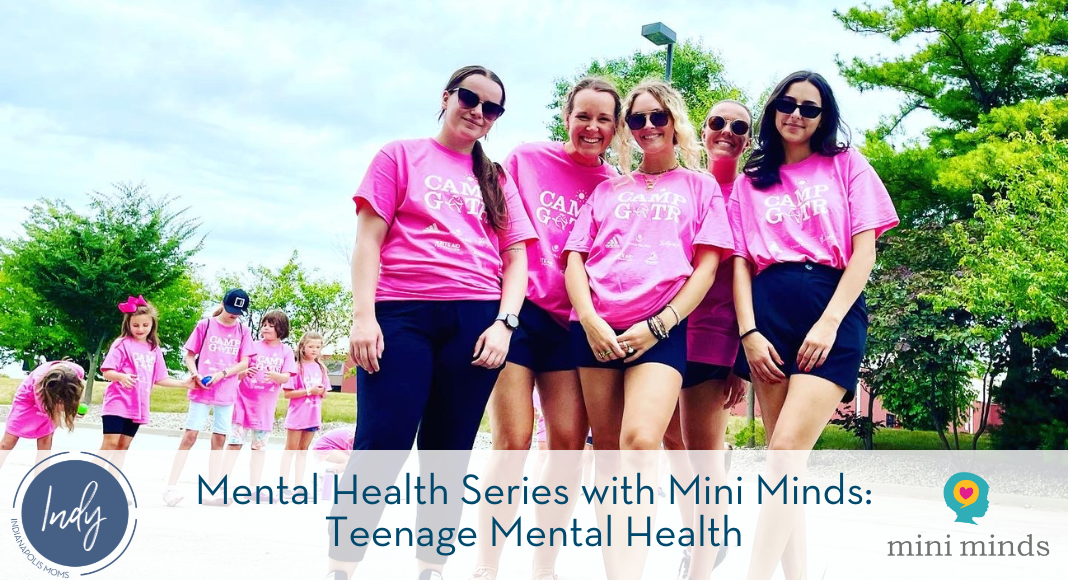We are back with Part Two of our three-part mental health series with Mini Minds. Located in Carmel and now McCordsville, Mini Minds is a therapy and mental health service provider. We spoke with owner Megan Peck and mental health therapist Briana Rowe about questions parents have about their teenager’s mental health. In case you missed it, make sure you check out Part One of our series about young children’s mental health.

What are your roles within Mini Minds and what services do you provide to Indianapolis area families?
As we mentioned in our first post of the series, not only is Peck the owner, but she and Rowe are both licensed mental health therapists with Mini Minds. They work with children as young as preschool age all the way up to college age teenagers. Their work is significant in that they work closely with parents on how to help with collaborative and effective communication strategies to help the whole family system.
Their mission at Mini Minds is to empower families to raise children, and teenagers, who thrive. The team is constantly educating themselves on the most up-to-date research, specifically brain and body research, as well as updated techniques and therapy styles to help support local families.
We know that anxiety can show up in many different ways. As kids get older, what are some of the most common signs of anxiety that you see exhibiting in teenagers?
Teenagers have worries about many different things as they grow older. It could be school related like upcoming tests, sharing projects in front of fellow classmates, extracurricular activity stress, or it could be about social situations and relationships. It’s an understatement to say the teenage years can be awkward and complicated, so parents should always expect their teen to have some anxiety or worries as they navigate life.
It’s when the anxiety starts to disrupt your teen’s daily routine that Peck suggest parents should dive a little deeper and analyze the anxiety. If your teen starts to avoid situations – social or school related – if they become disagreeable, moody, irritable, or even withdrawn and purposely isolated, it’s time to seek help.
As parents, what can we do to help our teenagers who may be exhibiting these signs of anxiety?
Peck says first and foremost, stay calm. It’s easier said than done sometimes, but you do have to take care of yourself in order to take care of your teenager. Raising a teenager can be very stressful, on top of stressors you have in your own life. “We always tell teenagers and their families to remember what the flight attendant says every time before takeoff,” says Peck. “They say, ‘In the event of an emergency, put the oxygen mask over yourself first before you help someone else.’ And we really work closely with parents of teenagers, and all ages for that matter, to make sure that they are taking care of themselves and their stressors and anxieties first.”
Rowe continues by saying that children of all ages, especially teens, use their parents as a guide or anchor, seeking out emotional cues on how to manage stress and anxiety. It’s important for parents to recognize that we need to keep ourselves in check and prioritize our happiness. Doing that will help create a safe space for our kids to come to us with their problems. We need to avoid making our teenager feel judged or even self conscious about how they’re feeling. Oftentimes our instinctual reaction is to fix the problem right away. “It can feel uncomfortable for us to see our kids struggling,” says Rowe. “Our number one goal is to create a safe space for our kids so they can feel safe in opening up.”
Another great tip from the Mini Minds team is to not draw on your own experiences as a teen to provide advice. Guaranteed, it’s the quickest way to get a teen to tune out, says Peck. Once you’ve lost that connection, it’s hard to get back. Let your teenager talk, even if it’s about something as simple as their favorite television show or hobbies. “If you can get used to having a back and forth conversation with your teenager about more neutral topics, it’s really going to pave the way for when things get a little bit more dicey,” says Peck.
The comparison game is huge for teenagers – what are some tips you share with parents to help their teens navigate this?
Acknowledgment is huge in working to identify triggers that may contribute to comparison anxiety in teens. It’s also a great way for parents and caregivers to connect with their teen, because moms also deal with jealousy and guilt that is associated with comparison, especially on social media. Showing your vulnerability when it comes to comparisons shows your teen that they are normal, their anxiety is normal, and you can work together to combat those feelings. Work on strategies together, for example, limiting time on social media during peak vacation weeks so you don’t fall into the comparison trap. It can help you both and make your relationship even stronger.
To learn more about Mini Minds and to make an appointment, visit their website here or give them a call at (317) 564-8332.
Stay tuned for Part Three of our mental health series when we will discuss caregiver anxiety with Mini Minds!
Check out the full interview here and learn more about Mini Minds:
About Mini Minds

Mini Minds wants to create a culture in your family in which both children and parents actively recognize challenges, seek solutions, welcome change and grow closer. To achieve this vision, they are offering personalized services to meet the needs of each unique child and family using a “whole brain, whole child, whole family” approach. Mini Minds prides themselves on taking the world’s latest brain research to develop skills and creating strategies that work for local families.









